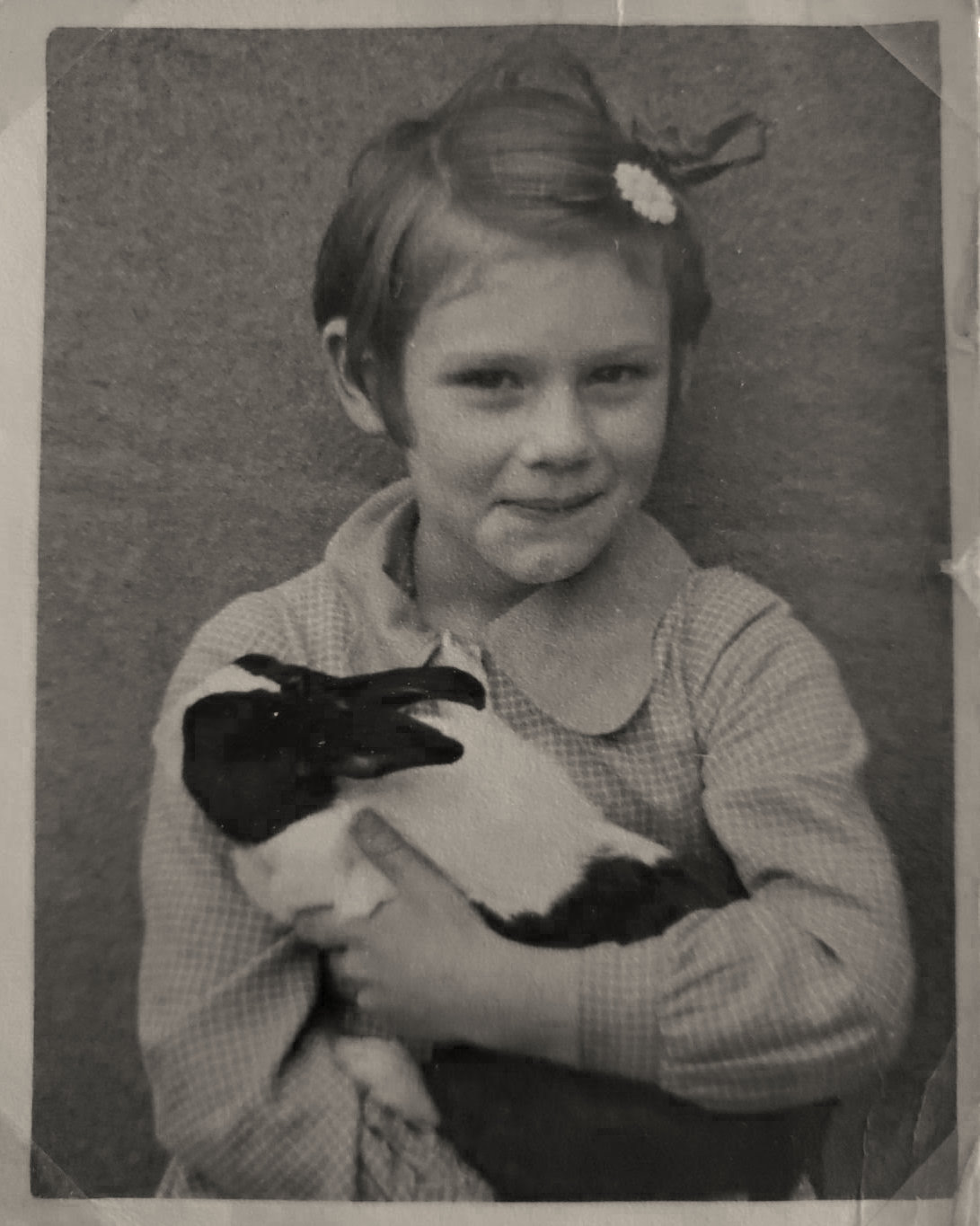A Time Before Vaccinations — An Opinion
By Marion Colledge
 It was in a corner of Leicestershire, England—1951.
It was in a corner of Leicestershire, England—1951.
‘What’s this white mark on my thigh?’ she asked Mother, when she was exploring her body, like three-year-olds do.
‘That’s your diphtheria immunisation scar. I was too young and inexperienced to refuse, said Mother, speaking ‘at her’ like an adult, as she always did.
After 1945 her father and mother had dug for health during the rationing. Their child didn’t refuse cabbage, beetroot, seakale, swede or parsnip with their meat and two veg dinner; nor the dessert spoonful of free cod liver oil in the morning. Her Mother quoted from a maroon-covered book The Living Soil by Eve Balfour, founder of the Soil Association:
‘You are what you eat, and that starts with the soil.’
She lived at Number 63. In her happy childhood, she played in the double garden with her cousin who lived at 65; on tricycles up and down the coal and coke ash-path slope; in the washing basket; on cousin’s grey-maned rocking horse, and at hide-and-seek round a huge green tool shed.
Later in 1951 at liver-dinner-time —Tuesday, ‘Mummy, I don’t want any more liver.’
‘Why not?’
‘It hurts to swallow.’
Mother went down to the surgery and the next day black-suited scary Doctor Horner came through the entry tunnel with his square instrument case, got out a white stethoscope. listened to her chest, and prodded under her ears.
‘Ouch!’
Mumps. Five days’ quarantine.
No vaccination invented. Cold compress last thing at night for ten minutes, with a thick dry towel wound like a scarf around her neck so she didn’t chill; squeezed orange with precious yellow Gale’s honey in the morning. (No lemons: still rationing). Swallowing food was fire.
‘Out you go in the garden,’ said Mother next day, as she wrapped her up in her ‘Red riding hood’ coat. Get that system cleared.’
Cousin Pat and she had to take turns playing their games in the blue-brick back yard, According to Pat, she’d already passed the mumps on and she came down with it three days later.
Mumps was generally a mild disease, though there were a few cases of resultant deafness.
Getting lots of colds and coughs the first winter in school was probably worse: she had a mile to walk there and back twice a day. By Thursday lunch-time she was ready to curl up in the only armchair and listen to Listen with Mother from the brown box.
Next came the assault by whooping cough. It was spring. She had the cough for two weeks, but played happily on her yellow trike around the quarter of an acre of garden clocking up the yards and strengthening her calves and knees—beyond her Grandpa’s frame of climbing roses and under the apple trees… There was an early vaccine. Her Mother commented that Pat, who had had the vaccination, had an undiagnosable husky rasp for six weeks.
The itch-to-die, puss-oozing ‘chicken’ spots struck in the lovely weather towards the end of the summer term 1955. Vaccination not yet invented. Pat’s family had left, so it wasn’t passed on. Two weeks quarantine. No need for Doctor Horner: they knew what it was. Mother dabbed the cooling pink calamine on the spots. Of course, she scratched quite a lot and there are a few little scars. (It was probably a little more uncomfortable for her own first child thirty years later —he had some spots in his mouth and crept into his parents’ bed for comfort).
The spots dried up just in time for her father to cut off the grey scabs from the hairs on her neck. Just as well, as it was his annual leave, their only chance to go on the train for two weeks to her Granny’s at Bournemouth.
1957 was one of the epidemic years for measles, with over 633,000 cases in England and over 90 deaths. She felt tired, had spots and was quarantined for a week. There must have been a lot of empty seats in school in that year. But most mothers didn’t work, so they were at home to look after their sick children. The country was still under the spell of government propaganda that working mothers could damage children’s attachment. This had probably been a useful ploy to save jobs for men at the end of the War in 1945.
A little over a year later, the brown box on the mantelpiece told the family of a poliomyelitis epidemic sixty miles away in Stoke on Trent. Polio was in another category because it could paralyse people. It is said that in the olden days children generally caught it while they still had immunity from their mother’s milk.
Her father said, ‘You woon’t gerrit. It’s people az swim at Blackpool tha’ gerrit. The council pumps raw sewage ‘inta’ the sea. Bournemouth’s all reet.’
The attenuated live British vaccine had just been approved by the Ministry of Health. Uptake was slow. Her mother claimed that children vaccinated carried the virus in their gut and could still spread the disease. She trusted Mother and she was glad she wasn’t having an injection.
An official in a black suit came through the entry. Officials never visited them. Her name had been given as a contact for E.Q., who’d caught polio.
‘We were talking near the field gate for five minutes. We weren’t near each other. I hadn’t seen him all holidays.’
‘No matter. Three weeks’ quarantine’, pronounced the official and left in his black car.
‘You know where ‘e went? Blackpool!’ said her father, arriving from the weaving factory across the road in his overalls.
E.Q. spent some time in hospital and recovered, with slight paralysis in the left upper lip.
She blossomed: She was jumping down10 feet from the Bramley apple-tree on to the soft ground of her mother’s flower-bed, keeping a hen’s egg-laying diary, pruning her grandfather’s rambler roses and learning Roman numerals from her thin blue school mathematics book.
If this were fiction, the story would end with her getting polio, but it isn’t, and doesn’t.
Come age thirteen, the high-pitched squeaks of the girls in the grammar school could be heard,
‘They stick six needles in you when they test you.’ Actually, it was six scratches.
If no antibodies were present, the BCG vaccination for tuberculosis would follow a week later. Three girls in the class had antibodies. Her mother did not sign the consent form: ‘It’s only 60% effective and you’re not having it.’
Proudly, she didn’t have any more time off school till she was fourteen. Spring-time again. A usually mild disease then called ‘German measles’, now rubella, was going round. The deputy headmistress made a girl showing spots stay at school for the second half of a day rather than sending her straight home, so she could spread it, for, as she said,
‘It’s good for girls to have it, so they don’t have it when they’re pregnant.’
She had to have five days off school, and do her end of term French examination at home, which really hurt her pride.
Aged twenty-two, this child was to adventure in India, and a year later volunteer as a teacher in the Ivory Coast. She had to have polio, tetanus, typhoid, and yellow fever vaccinations, but not the tuberculosis one. The ‘six needles test’ showed she had somehow developed natural immunity to TB.
Was her mother playing God with her health? She doesn’t think so – But few people benefit from consistent feeding with organic home-grown vegetables, herbs, and stoneground wholemeal bread, so their immunity might not be built up in the same way as hers.
As you may have guessed, this is the author’s story.
Herd immunity is very important. But the cases of immune systems overstressed by vaccinations are rarely recognised, as they are hard to prove. Recently there were many cases of mumps in the US, among people who’d been vaccinated as children.
Importantly, a polio epidemiologist working in Sierra Leone with a live attenuated polio vaccine, wrote in the EU magazine last year that dead vaccines reduce the body’s response to other diseases for several months (do most people actually know this?) whereas live ones incite not only a specific immune response, but prime an immune response against other diseases too… However, live attenuated polio vaccine is banned in the EU for the reason that it may escape and become wild again with disastrous consequences.
I was undecided whether to have a COVID vaccination, and at the start of the pandemic began taking a zinc supplement and a huge dose of vitamin C, as well as my usual Omega 3, and Vitamin D spray from October to April when this island is not blessed with sunshine. I put the brandy bottle, a teaspoon and some cups and Manuka honey upstairs next to my bed, just in case I got COVID.
(When I was a child, my father’s family had a pre-NHA, pre-War book called The Doctor’s Book. They knew how to revive a person with a tiny bit of brandy and water. And by the time I was thirteen, I’d learned how to revive a failing hen or a rabbit with three drops of brandy in a spoonful of water).
I’m not one of these stupid people who doesn’t believe COVID exists! I know people who’ve got nastily ill with it. At the start of the pandemic, I was already tapping immunity points, as recommended in acupuncture. My breathing’s never been particularly deep, and one of my children recommended that I do deep breathing exercises with my yoga teacher. This should keep capillaries near the base of the lungs more open. I kept out of crowds, and thanks to friends, away from stores, and did my gardening, cycling, and on-line work. I rigorously wore masks when travelling on the abandoned trains to my granddaughter’s.
I don’t have the ‘flu’ vaccination and have only ever had ‘flu’ twice, on occasions when I was either about to be made redundant, or just after I had been made so. I rather keep myself to myself and don’t socialise much–except with my granddaughter.
In the end I did have the Astra Zeneca vaccination
— because it’s – for the nation, and because family were pressurising me. I have several allergies—to cleaning products and perfumes—there are chemicals in the Pfizer vaccine that I might be allergic to, and I don’t like the idea of its technology, so if I’d been offered it, I’d have refused.
While the government mobilised the army, volunteers from charitable ambulance organisations, as well as retired medical staff, to distribute vaccinations to fifteen million people in seven weeks, it failed to advocate to any great extent taking high dose zinc, Vitamin C, D and Omega 3, eating fresh fruit and vegetables, or deep-breathing exercises, to build up the nation’s immunity. At least it is now recommending fresh air to be allowed into rooms.
This is a coronavirus, and these, like the common cold, mutate rapidly. Pfizer and Astra Zeneca are busy developing a booster jab for the South African and some other variants. This major vaccination effort will have to continue in future years, taking up much health care staff time, just as with the ‘flu’ jab’.
Early border closure, wearing masks, keeping one meter apart—within households of affected families, and having good contact tracing, as in Hong Kong, Vietnam and Taiwan, would so have helped the UK. Even in May 2021, the border closure with India has probably occurred too late. Better diets and breathing could still help.
And here I am, always trying to improve my sandy limey soil, with leaves, grass cuttings, horse manure in order for the soil to have all the important trace elements, and growing and freezing antioxidants like blackcurrants, grapes and raspberries, feeling sad for people in squashed estates hostage to jaded or junk supermarket food.
Marion Colledge
 Marion is a teacher, writer, fruit, herb and vegetable gardener, a pre-pandemic traveller and a passionate advocate for equality among the nations. She used to write academic articles, but now she writes memoir pieces. Her creative work has previously featured in a chapbook by HelenCoxBooks, and in the London CityLit Anthology 2019. For further info on Marion please see marioncolledge.co.uk or her Twitter Nature and Gardening Notes: @Marioncolledge
Marion is a teacher, writer, fruit, herb and vegetable gardener, a pre-pandemic traveller and a passionate advocate for equality among the nations. She used to write academic articles, but now she writes memoir pieces. Her creative work has previously featured in a chapbook by HelenCoxBooks, and in the London CityLit Anthology 2019. For further info on Marion please see marioncolledge.co.uk or her Twitter Nature and Gardening Notes: @Marioncolledge




Leave A Comment